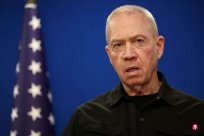
(Washington Composite Electric) U.S. President Bynden Bayeng won the primary election of the Michigan Democratic Party with an overwhelming advantage on Tuesday (February 27), but a large proportion of voters chose "no statement" on the votes, which could not help worshipDeng's election is covered with shadows.
On the same day, the Republican primaries held in Michigan, former President Trump again easily defeated Heili, former governor of South Carolina.
In the Democratic Election, Biden's biggest challenge was not from another candidate, but from Arabic American voters, progressive people and young people.In the voting on Tuesday, a large proportion of voters chose "Uncommitted" on the votes to protest the support of Biden for Israel.
Reuters reports that in the nearly half of the votes that have been calculated, there are more than 58,000 Democratic voters who have chosen "not expressing their dissertation", far exceeding the 10,000 "non -state" votes target that the protest sponsor hopes to obtain.Essence
According to the predictions of Edison Research Company, Trump's voting rate was sharply left from Heili, and the primary selection of the Republican Party of Michigan was easily won, which further consolidated his opportunity to get the nomination of Republican presidential candidates.
Among the nearly half of the votes calculated by the Democratic Party, Biden received 80%of the support, and "not expressed" accounted for 13%; of the 58%of the Republican Party's calculation, Trump's votes were 67%, andHeili's vote rate is only 27%.
poll: political extremism is the most worried about the subject
According to the latest polls of Reuters / Iposo, political extremism or concerns about democratic threats have become the most worried topic for American voters.Biden has an advantage in Trump, who is seeking to return to the White House in this subject.
Reuters reports that this three -day polls will be on February 25. About 21%of the respondents say that "political extremism or threat to democracy" is the biggest problem facing the United States.Slightly higher than the respondents who choose economy (19%) and immigration (18%).




